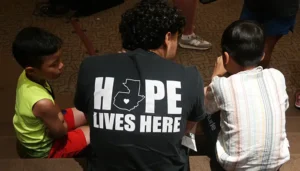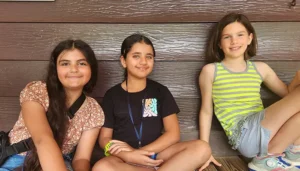
Roughly one-fourth of the counselors, like the one pictured here on the left, at the 2025 All Nations Camp were previous attendees.
FRANKLIN — When the apostle John received his vision of heaven, he wrote in Revelation 7:9 that he beheld “a great multitude … of all nations, tribes, peoples, and tongues, standing before the throne and before the Lamb…”
It’s a glimpse into eternity, but the verse also describes All Nations Camp, which was held in June at Linden Valley and Carson Springs.
“Revelation reminds us that there’ll be the multitude from every nation, tribe and tongue that’ll be gathered around the throne singing one song: ‘Worthy is the Lamb. Salvation belongs to him,’” said William Burton, ethnic church specialist for the Tennessee Baptist Mission Board.
All Nations Camp is a two-week program for children ages 7 to 17 from diverse backgrounds. The participants include immigrants, refugees and returnees seeking community and communion with the Lord. They come from everywhere — Ukraine to Hungary, Kurdistan, Laos, Korea, China, Nigeria, Egypt and throughout South and Central America.
“Most of our kids are here because of political instability in the country their parents are from,” Burton said.

William Burton, ethnic church specialist for the Tennessee Baptist Mission Board, leads a time of worship for attendees at this year’s All Nations Camp.
“That may be where they’ve grown up or where they were born, and it’s forced them to migrate, although there was not refugee status for them. Others moved because of war or maybe a natural disaster, from a refugee camp to refugee status in another country.
“So a lot of our kids deal with trauma. We take those things into consideration as we make our programming and our training for our volunteers and staff.”
High participation
Burton reported striking numbers for the 2025 All Nations Camp: 527 participants representing 29 different nationalities and 41 different people groups.
Twenty-eight different churches participated, with seven attending for the first time because of new church plants. That means 19% of Tennessee’s ethnic churches participated in the 2025 camp, according to Burton.
New churches receive additional support the first year they send students. Beyond the funding already provided by the Golden Offering for Tennessee Missions, new churches receive an additional 50% scholarship to encourage them to return.
“The missional passion of Tennessee Baptists to support All Nations Camp and make that available to kids who would not be able to go — I’m grateful for that,” Burton said. “Hopefully this will be something that will continue until the Lord comes back.”

This year’s All Nations Camp included 527 participants, representing 29 different nationalities and 41 different people groups.
The support ultimately encourages returnees, with 25% of this year’s staff being former campers.
Though the camp doesn’t provide translators, most children and counselors speak English. When language barriers do arise, they don’t stop connection.
“The beautiful thing is you see kids from Mexico and Colombia playing soccer with kids from Korea and Burma,” Burton said. “It is truly a United Nations.”
A growing need
In the 1990s, the Woman’s Missionary Union recognized the need for such a summer program, initially focusing on the growing Laotian population.
Today, Burton sees the growth of ethnic churches happening for two reasons: the general increase in migration and the maturation of existing ethnic churches that have been established for 10 to 20 years.
“They’ve matured their passion for the Great Commission, the missional heritage of Southern Baptists,” Burton said. “So they’re taking the gospel to their community.”
Burton specifically noted the worship time this year, where children were extremely engaged, showing sensitivity and hunger for God’s Word with an intensity present at both camps.
“There’s a spark of revival there,” Burton said, emphasizing how this connects with the Acts 2:17 Initiative. “I think some great days are ahead of us for the gospel. The opportunities are limitless. And there’s a generation — I call it the Joshua Generation — they’re going to lead us into the Promised Land.”
This year’s camp saw 70 salvation decisions, 53 recommitments and 15 calls to ministry. For those called to ministry, Burton maintains contact with the children and their pastors throughout the year.
“We hopefully want to get them in a pipeline to cultivate and nurture that call to see what God’s doing in their life,” Burton said.
The seven new churches that sent children this year demonstrate that “the churches that send their kids to camp know it is all about personal relationships,” Burton said.
Burton also thanked the many volunteers and staff who dedicated their time to serving these children.
“This year was definitely an all-star staff. I just can’t say enough about it, and it made that whole camp just run so well,” Burton said. “That was one of my favorite parts — to see that leadership among them.” B&R

